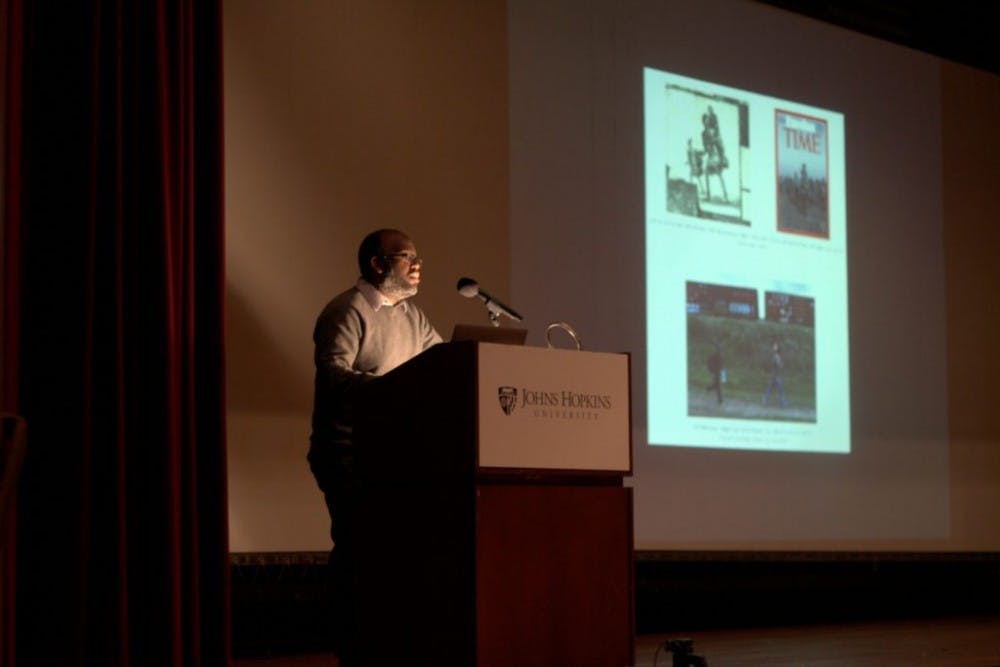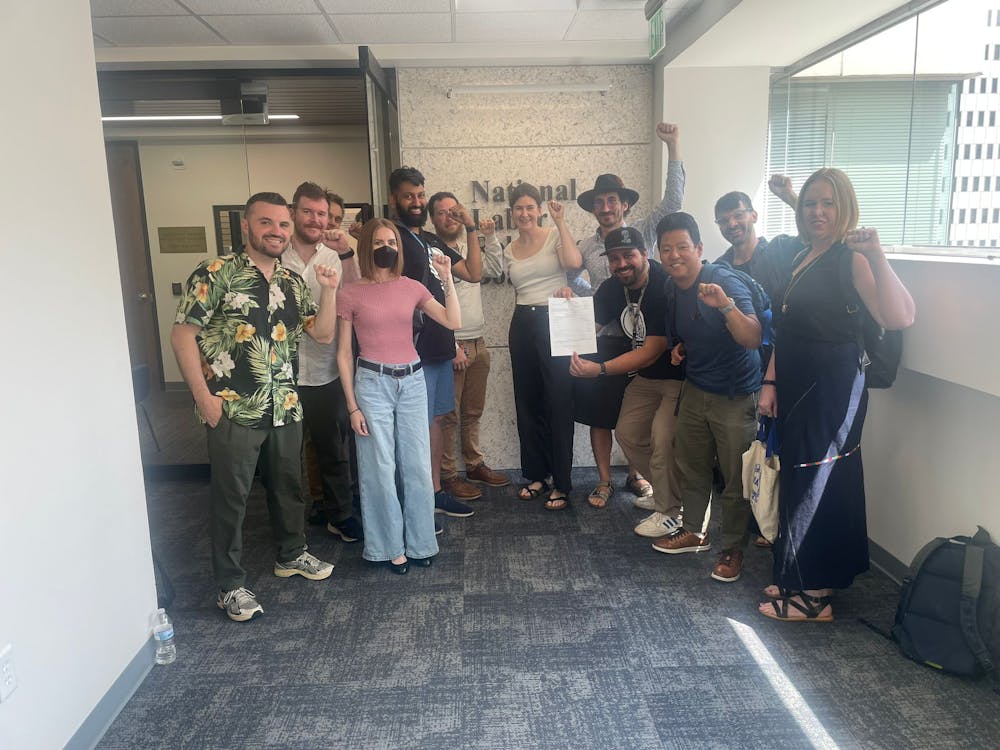In 1989, Dan-el Padilla Peralta, an associate professor of classics at Princeton University, began his life as an undocumented immigrant in New York City when his parents overstayed a tourist visa.
Up through sixth grade, he lived in shelters and temporary housing as his family situation deteriorated, but became interested in books at the shelter’s library. Peralta’s interest in classics earned him early admission to Princeton with a full scholarship.
He wrote Undocumented: A Dominican Boy’s Odyssey from a Homeless Shelter to the Ivy League to relate his life story.
Peralta spoke on Mar. 30 in Shriver Hall about his book, as the first of the Richard A. Macksey lectures. These lectures are designed to promote classics and humanism and provide a personal perspective on topics relevant to current American politics.
Professor and Chair of the Department of Classics Shane Butler introduced Peralta and shared his own experiences fighting for rights as a gay man married to an immigrant. He recalled how he and his husband once had to flee overseas due to the Defense of Marriage Act of 1996, which defined marriage as a union only between a man and a woman.
“Our story is a reminder that [some] of us on college campuses can tell first-hand stories about this country’s broken immigration system, ranging from the relatively mild, as in my family’s case, to the mind-blowingly brutal,” he said.
Peralta began his talk explaining how as an academic and an author, he can use his position to show how failures in the immigration system disrupt lives. He pointed out that the stories of unexpectedly successful immigrants are not necessarily more important than the stories of other immigrants.
“Shane has outlined beautifully what the stakes of the conversation... we have tonight will have,” he said. “It’s a reckoning of what it means to be humane at a time when the practice of humanities and the humanity of those systemically oppressed are under assault.”
Due to complications that arose when Peralta’s mother was pregnant with his brother, his family came to the United States from the Dominican Republic. However, as his mother’s hospitalization dragged on, his parents wanted their sons to benefit from public education in America.
Peralta first became aware of his status at the Collegiate School in New York City, a school in the Ivy Preparatory School League. He began to see the shortcomings of U.S. immigration law, and his undocumented status made him anxious about his future.
“What that encounter with the various facets of being undocumented did for me... was leave me in a bit of a psycho-emotional rut,” Peralta said. “I was beginning to perceive, dimly at first but with greater clarity... that my undocumented status shot many of the dreams that I nourished and cultivated.”
He saw arguments against immigration while looking through newspaper articles.
“I read the rants of xenophobics who would invoke the law to cover their xenophobia, saying that since the illegals didn’t follow the law and didn’t wait their turn in line,” he said. “I wanted to ask them, ‘What if the laws don’t make sense? What if they don’t take into account the types of experiences my family had? What if the laws are simply wrong?’”
His parents tried to become citizens after their visa expired, but they did not know how. Instead, they trusted someone their friends knew, who promised to file the right paperwork. That person turned out to be a hustler who took away the family’s savings. Then his parents divorced and his father returned to the Dominican Republic in 1993.
Peralta looked back upon the dire situation his family faced at the time.
“[My mother] was worried at her inability to maintain a secure employment, but she believed that with the help of some of the public assistance benefits for which my brother was eligible, we would be able to live,” he said. “This was not to be.”
Peralta also points out that luck helped him look to a brighter future. First, his shelter happened to have a library, since it was at the site of a former school. Reading helped him escape from his stressful situation and introduced him to the beginnings of his academic career. Then Peralta met a mentor who noticed him reading books while in the shelter.
“Once he spotted me reading, he kept asking me questions,” he said. “And once he saw that I had opinions about the texts I was reading, he decided that he was going to become my friend... He determined that not only was it important for us to continue having conversations on a daily basis, but that he had to intervene in my life.”
At the end of the talk, Peralta encouraged the audience to read a book about mass incarceration called The New Jim Crow by Michelle Alexander and compare it to his own book. He tied mass deportation to the issue of mass incarceration.
“They largely rely on the same set of disciplinary techniques, the same practices of deportation incarceration,” he said. “The people who are rounded up by the immigration-incarceration complex are being rounded up for no other reason than having a specific immigration violation on their record.”
The audience also had the opportunity to ask questions on the psychological effects of being undocumented and on Peralta’s thoughts on Trump’s presidency.
Drawing from his experiences as a teacher, he believes people must acknowledge the existence of suffering among different oppressed groups. However, he worries about how progressives will prioritize their agenda with social justice.
“We should not say, let’s do that and not do the work that comes with advocating for social justice... The dilemma as I see it is how do you do honor to the suffering of all of these groups without setting up a hierarchy of these groups to have primary preference over the other,” he said. “And I think there’s going to be a lot of infighting over what the priorities can be, and that can be quite corrosive in the process.”
Junior Darius Mostaghimi found that Peralta’s talk opened his eyes to what it is like to live as an undocumented immigrant in the United States.
“For a person who starts out in an underprivileged position, there are a lot of advantages that you become aware of. [Peralta] recognized the fact that he was lucky and... that people in his position weren’t as lucky in getting the chance that he did,” he said.
Doctoral student Erwin Hesse is working on a dissertation about the high school to college transition of undocumented students. He spoke about the importance of Peralta’s story in debunking false stereotypes about undocumented immigrants.
“I feel like his story is a reflection of the majority of immigrants who work hard and want to make the U.S. better but don’t have a chance to do that,” he said. “This is the type of example that Donald Trump needs to hear and listen to, rather than calling them criminals and rapists.”
To people who think that undocumented immigrants should have ‘waited in line,’ Hesse said that the immigration process is unreasonably inefficient.
“Those who are brought here as undocumented don’t have a line to wait in. If you look at the ICE [Immigration Customs and Enforcement] immigration forms, if you answer some of the questions, there are no lines to wait in,” Hesse said. ”There needs to be some sort of compassion and empathy from government.”





